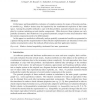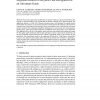33 search results - page 5 / 7 » Evaluating the dynamic behaviour of Python applications |
126
click to vote
ASUNAM
2009
IEEE
15 years 8 months ago
2009
IEEE
—The “wisdom of the crowds” is a concept used to describe the utility of harnessing group behaviour, where user opinion evolves over time and the opinion of the masses collec...
101
click to vote
SIGDOC
2005
ACM
15 years 7 months ago
2005
ACM
Theoretical and technological progress has revived the interest in the design of services for the support of co-located human-human communication and collaboration, witnessing the...
106
click to vote
ATAL
2004
Springer
15 years 7 months ago
2004
Springer
Several innovative software applications such as those required by ambient intelligence, the semantic grid, e-commerce and e-marketing, can be viewed as open societies of heteroge...
141
click to vote
PE
2011
Springer
14 years 9 months ago
2011
Springer
Performance and dependability evaluation of complex systems by means of dynamic stochastic models (e.g. Markov chains) may be impaired by the combinatorial explosion of their stat...
140
click to vote
UMUAI
1998
15 years 1 months ago
1998
We present an approach to keyhole plan recognition which uses a dynamic belief (Bayesian) network to represent features of the domain that are needed to identify users’ plans and...


